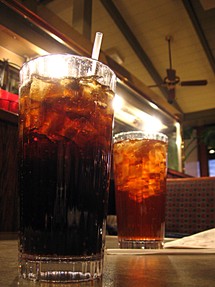
In one study which made the rounds in 2011, researchers followed 474 diet soda drinkers in the 65 to 74 age range for almost 10 years. Their findings were that the waistlines of the diet soda drinkers grew 70% more than the non diet soda drinkers! "Specifically, drinking two or more diet sodas a day busted belt sizes five times more than people who avoided the stuff entirely." (
Source) But why could that be the case? There are numerous suspected causes and potential reasons to link diet soda and weight gain:
Diet soda may actually intensify your cravings to eat more.
There are several theories and studies which suggest how this could be the case. One is that consumption of too many artificial sweeteners (in soda and otherwise) can interfere with the bacteria in our gut, how they process food and send signals of fullness and satisfaction to the brain. When these signals are interrupted, we keep eating more because we don't realize we've reached a point of being full. ("The strange reason diet soda makes you fat", "Could diet soda make you fat?")
Diet soda may cause an insulin "spike" and contribute to the development of diabetes and heart disease.
Although these findings are controversial and refuted by some, studies in mice fed a diet high in aspartame (the artificial sweetener found in most diet sodas) had higher blood sugar levels than those fed a normal diet. ("New study is wake-up call for diet soda drinkers.") It is suggested that the artificial sweeteners actually increase our appetite for sweets by triggering the body's normal response to consuming sugar while not actually "delivering the goods", so to speak. Other studies have linked artificial sweeteners with metabolic syndrome, a set of risk factors for developing diabetes and heart disease such as abdominal obesity and high blood pressure. ("Metabolic Syndrome Tied to Diet Soda in New Study.")
Aspartame may exacerbate depression and anxiety - which can cause us to overeat.
"Emotional eaters" are often prone to coping with anxiety and depression by seeking comfort in food, even binge eating. Some studies suggest that aspartame can adversely affect those already suffering from anxiety, depression or bipolar disorder. ("Can Drinking Diet Coke Cause Depression?")
Diet soda creates the mental "excuse" to indulge in other ways.
It's sort of a running joke you hear in the media so often: an overweight person goes to a restaurant or fast food establishment, orders a "Supersized" burger and fries, and washes it down with a diet soda. But it is true that a person might use drinking a diet soda as an excuse to eat a larger meal or other sweets when they don't need to, and end up negating any calorie savings that would have been enjoyed from drinking that diet beverage.
Diet soda is simply not a cure-all for weight loss.
If an individual has physical, emotional or mental conditions that predispose them toward weight gain, drinking diet soda isn't going to fix those underlying issues. Whether or not you believe some of the possible scientific evidence against diet soda, it is clear that the consumption (or non-consumption) of sugar-laced beverages is only one factor in dietary moderation that needs to be addressed.
Diet soda and artificial sweeteners may be linked to other serious health concerns.
"FDA Should Reconsider Aspartame Cancer Risks", says one study. "On Overdue Ban on a Dangerous Sweetener", others suggest, pointing out the long-standing controversy and history of the FDA approval of aspartame. "Aspartame is not the only thing in diet cola that can kill you", proclaims another headline in an article about another dangerous chemical found in many regular and diet sodas alike.
Image credit: arker at morguefile.com.


 In one study which made the rounds in 2011, researchers followed 474 diet soda drinkers in the 65 to 74 age range for almost 10 years. Their findings were that the waistlines of the diet soda drinkers grew 70% more than the non diet soda drinkers! "Specifically, drinking two or more diet sodas a day busted belt sizes five times more than people who avoided the stuff entirely." (
In one study which made the rounds in 2011, researchers followed 474 diet soda drinkers in the 65 to 74 age range for almost 10 years. Their findings were that the waistlines of the diet soda drinkers grew 70% more than the non diet soda drinkers! "Specifically, drinking two or more diet sodas a day busted belt sizes five times more than people who avoided the stuff entirely." (


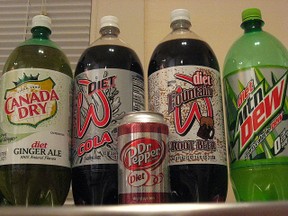 Twice in my life I've made the conscious and determined decision to give up diet soda completely - and I am only annoyed at myself for falling off that wagon once because I know it does not do good things for my health and well being.
Twice in my life I've made the conscious and determined decision to give up diet soda completely - and I am only annoyed at myself for falling off that wagon once because I know it does not do good things for my health and well being. AmeriBev
on 02/25/2015
AmeriBev
on 02/25/2015

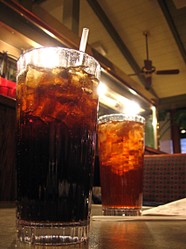

 A Potentially Fatal Accident in the Homeon 11/24/2018
A Potentially Fatal Accident in the Homeon 11/24/2018
 Windsurfing Lessons on Montserrat: One of My Funniest—and Fondest—Travel Memorieson 11/20/2018
Windsurfing Lessons on Montserrat: One of My Funniest—and Fondest—Travel Memorieson 11/20/2018
 Christmas Ornaments Celebrating Rome, Italyon 11/12/2018
Christmas Ornaments Celebrating Rome, Italyon 11/12/2018
 Philadelphia-Themed Christmas Ornamentson 11/09/2018
Philadelphia-Themed Christmas Ornamentson 11/09/2018


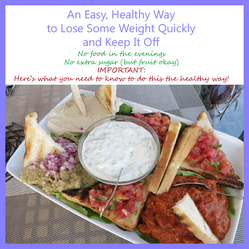
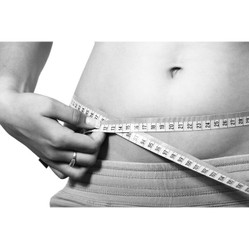
Comments